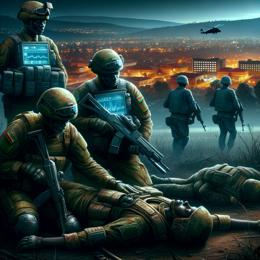Image created by AI
Turmoil in Moscow: FSB Officer Killed in Defense Ministry Building
A grave incident unfolded in central Moscow, leading to the death of Vladimir Feshchenko, a counterintelligence officer with the Russian Federal Security Service (FSB), within a Ministry of Defense controlled building. The news, breaking across various domestic media platforms, pointed to a severe breach of security in one of the nation's most fortified structures.
The event occurred on the night of January 13th, echoing through the corridors of a building that accommodates several strategic military departments, including the FSB Directorate overseeing the Moscow Military District. Reports from VChK-OGPU, a channel affiliated with the security service, affirmed the location's significance, underscoring the critical nature of the tragedy.
Initial details emerging from the incident suggest a fatal altercation, possibly during a disagreement between Feshchenko and another individual. Renowned Russian publication RBC shed light on the ongoing investigation, hinting at a theory of negligent homicide, although full details of the motive and circumstances remain closely monitored by authorities.
The suspect involved in this fatal shooting has been apprehended, with charges of murder leveled against him, as disclosed by RIA Novosti. However, the identity and possible motives of the suspect are still under wraps, raising numerous questions about the security protocols and internal dynamics within the Ministry of Defense.
Further intriguing is the personal background of the deceased officer, identified by TASS as a national kettlebell lifting champion, adding a layer of complexity and public interest to his profile. The absence of direct reference to Feshchenko’s FSB role in some reports suggests possible sensitivities or controversies surrounding his official duties and affiliations.
This lethal breach not only raises alarms about the safety protocols at one of Russia’s most critical defense infrastructures but also about the internal tensions that may exist within the ranks of the country’s elite security forces. As the investigation continues, many await to see what ramifications this incident will have on operational security protocols and personnel management within the Russian military and its associated intelligence agencies.










